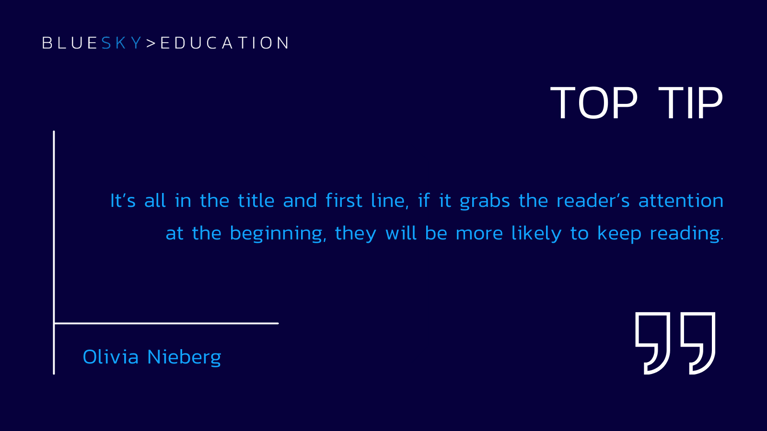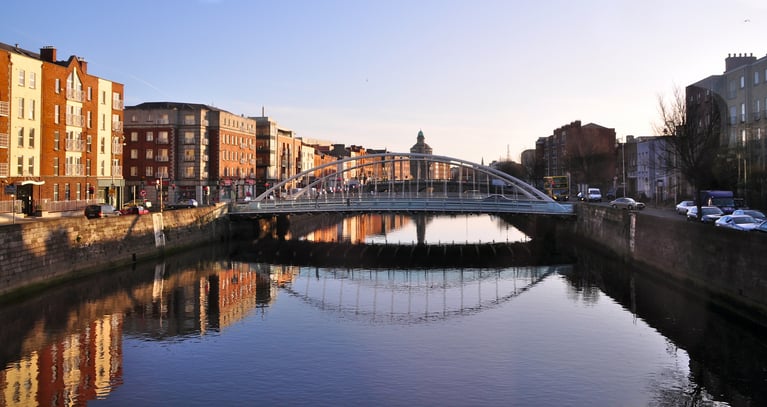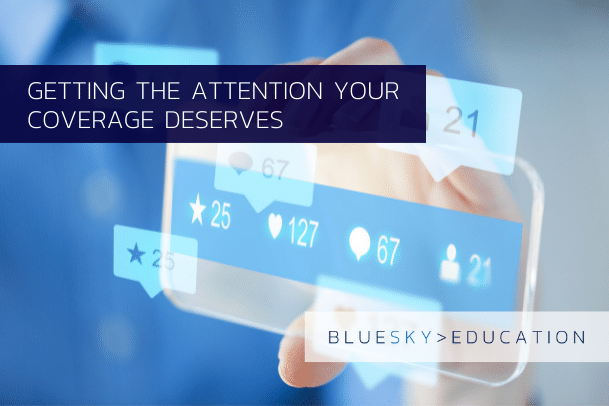
How to select success stories that will boost applications
As a business school or university, students are integral to the existence of your institution. After all, what is a school without the individuals who want to learn?

Why it’s easier to succeed with press coverage than you might think
Do you find yourself apprehensive about engaging with the media to secure press coverage?

PR lessons from your competitors – what works
When it comes to media work for business schools and higher education, there are a number of topics and areas that can be used as story ideas for the media. Perhaps there is a new research paper to share or an academic has an opinion they want to express.

How to get coverage in science press
Science press aims to provide coverage on current scientific research and findings which are often especially relevant to current news and trends, from natural disasters and the impact of climate change to public health and the psychology of modern life; there are always scientific topics out there that the public love to read about. A widespread discipline, science press can specialise in different areas such as biology, chemistry, health, sustainability, and medicine, just to name a few.

How PR helps institutions talk about ESG efforts
Improving our relationship with the planet is vital as the lack of consideration for the natural environment is impacting more than just people (animals, ecosystems, etc.). A warming planet leads to changes in our climate, causing heatwaves to become more likely, and has exacerbated the cost of living as rising sea levels interrupt supply chains, affecting the availability and cost of goods.

PR buzzwords that are actually worth paying attention to
In the world of public relations, buzzwords can come and go faster than you can say "press release".

How to work with journalists in Italy
Italy is well-known for many things; Pizza, pasta, and gelato in the culinary sense; da Vinci and Michelangelo for artists; Armani and Versace in the fashion world; or Lamborghini and Ferrari if you’re into cars.

What PR is all about
Have you ever considered hiring or working with a PR agency, but you’re not entirely sure of what PR entails?

How to write an effective pitch
While a press release can work great for the launch of a new school or interesting findings from a new research paper, some topics will be more successful if pitched as an idea for a wider article.

A guide to ghost-writing
Ghost-writing involves writing an article or other piece of copy on behalf of somebody else who will be the named author. For example, this could involve using a research paper and notes to write an article for a brilliant professor lacking the English fluency to do their research justice or unable to reach a publication’s deadline due to other commitments. View this post on Instagram A post shared by BlueSky Education (@bluesky_edu)

How to secure media interviews for travelling faculty
International media coverage is one of the goals which business school PR departments can target with their PR campaigns. Not only does international recognition build a school’s brand at a much larger scale, international coverage can also be used to reach new markets for student recruitment, promote new courses, and showcase successful alumni, among other things.

Four communication tips that will help you get national media coverage
When it comes to approaching PR, you should tailor your media approach based on the specific goals you would like to achieve, which can be incredibly varied. You might want to increase student uptake, publications mentioning your research, or international and trade media coverage.

Building a community of advocates (why, who and how)
In Education PR, there are a number of different approaches you can take to boost the profile of your business school or university in the media depending on what your specific goals are.

7 tell-tale signs you need a new marketing communications agency
Finding yourself a marketing communications agency that works for your institution will enable you to achieve wonders when working together.

7 things about media relations the Dean should know
As the Dean of an institution, you hold considerable responsibility for cultivating relationships with both internal and external stakeholders, including donors, alumni, and the community. You are also responsible for protecting and building your school’s reputation and faculty. Success in these areas is vital and it often hinges on maintaining and preserving good relationships. View this post on Instagram A post shared by BlueSky Education (@bluesky_edu)

Top tips for a successful pitch
A more personalised and targeted method of disseminating interesting information about your institution or organisation to journalists is through pitching. Pitching involves suggesting a potential story idea to a journalist for a piece that you can provide content or comment for.

Who is the most followed on the Thinkers50 list?
When launched in 2001, Thinkers50 was the first-ever global ranking of management thinkers. Since then, it has published a new list every two years, and remains the premier ranking of its kind.

5 top tips for developing a PR strategy for business school rankings
Barely a month goes by without a media league table of the world’s top universities and business schools. One month, it’s the rankings for business schools in Europe and the next it’s the rankings for MBAs, followed by rankings for Master’s programmes. The rankings for business schools and universities can feel constant and the wide variety of ranking tables published by a number of sources such as Forbes, The Economist, the Financial Times, and QS means that many schools can frequently see significant rises and falls.

How to boost applications to your EMBA using PR
Business schools around the world offer a vast selection of postgraduate courses, some of which are more commonly offered amongst institutions, such as Master in Management, Master in Finance, or MBA courses, as well as more specialised programmes, such as a Master of Management in Energy or a Master in Auditing. A postgraduate course offered at many different business schools is the Executive MBA (EMBA), a degree programme specifically designed for corporate executives and senior managers. With any business school programme, you will want to ensure there is a high enough number of applicants for your EMBA. This is where PR can be vital; business schools can use PR for a number of different reasons depending on the goals they have set out. One such goal is to increase applications and recruitment to a specific programme. Here are some ways in which PR can help your institution enhance its media presence and boost applications to your institution’s EMBA:

Top tips for creating a viral press release
A press release is a vital tool when working in PR or comms for a university or business school. It is a great way to disseminate information quickly to a large number of people, whether that’s new or interesting research from your institution or information on new programmes that you want to share with journalists.

How to get broadcast media opportunities
Broadcast media can include a number of coverage types ranging from television and radio to podcasts.

Top PR fails of 2020 – lessons for universities and business schools
It goes without saying, that 2020 will go down in history for a number of reasons: the COVID-19 pandemic, Brexit, Trump’s response to the election and the attack on the US Capitol, just to name a few.

Are PR agencies worth it?
What is PR? As an institution, you might be interested in hiring a PR agency and wondering whether PR agencies are worth it.

New PR strategies
Maximising the success of any institution or organisation often depends on having a winning PR strategy. Being able to impact the way in which your target audience – whether that’s stakeholders, prospective clients, and target consumers - perceive your organisation is vital to ensuring long-term success. And this doesn’t only apply to fashion brands, tech companies, or fast-food restaurants; this also applies to business schools and universities.

How do you measure the results of a university PR campaign?
As with any other service you purchase; you want to be able to measure if it has been worth the cost. But with PR, this may not always be easy or obvious. PR works by attempting to influence and change the behaviour, thoughts, and decisions of others. This can be a hard thing to measure, but it’s a lot easier to see the results of a PR campaign if you first outline the impact you want your campaign to have.

What is SEO?
When looking for information on a university, or for a specific course to study, or even for how to boil an egg, we would all probably do the same thing: Google it. Then, when we choose which website to visit, it’s probably going to be from the first page of results. The top results you see depend on the SEO ranking of the content on that site. But what exactly is SEO?

How to make your Dean famous
As the head of a business school or other higher education institution, a Dean is in a position of leadership with their profile inextricably linked to that of the institution – think of the Dean as the face of the school’s brand, possibly even their secret weapon.

Why hire a PR agency
Public Relations is an exceedingly broad area used by a whole host of varied clients, from politicians and actors to universities and businesses. The set of goals and needs can differ greatly from one client to another: an actor might want to boost their profile for a new film or fix their image after some bad publicity while a university might be launching a new programme or want to focus on boosting student applications. There are seemingly endless reasons for why a client has hired a PR agency or, if they haven’t already, why they should hire one.

Why cultural diversity in the classroom is an asset
The world is bursting with people from different cultures; identities formed from the environment we grew up in, our family, friends, and where we were born, among other things. It influences how we engage with the world, the perspectives we take, and the expectations we have. Culture can influence what we consider success in our careers, how we understand music, and even define how we see colours. Every single one of us has a culture, and most of us have identities built from multiple cultures; whether it’s our race, ethnicity, religion, or nationality.

What sort of university PR return on investment can I expect?
What are the results of PR efforts for universities? If you are investing money in a service or product, you will want to know whether the investment is worth the time and money. For example, if you’re investing a lot of money in a house, it will only be worth it if the house increases in value. The results of this type of investment is easy to see – an increase in value means it was a good investment.

Public Relations vs. Propaganda, Marketing, and Publicity
PR features in a lot of movies and TV shows, albeit in a dramatized and sometimes inaccurate way; Scandal, Sex and the City, and House of Cards all portraying various aspects of PR in a way that shapes what the general public think PR actually is. In fact, when I tell my friends that I work in Public Relations and what that involves, I am often met with responses similar to the following:

From Pitch to Publication: What to do when your pitch gets a yes
You have finally written the perfect pitch; catchy headline, fascinating content, and sent it out to a plethora of relevant journalists. Then, a journalist responds, interested in featuring a piece from your client. But what do you do next?

How to work effectively with media in The Republic of Ireland
The Republic of Ireland occupies 26 of the 32 counties which make up Ireland, Europe’s second-largest island, with one-third of the country’s entire population residing in the greater Dublin area. Although it shares an island and a border with Northern Ireland, a part of the United Kingdom, it is not itself a part of the UK. Therefore, the Republic of Ireland has its own unique media landscape with a massively developing technology and business sector, making the Emerald Isle an up and coming destination for many international higher education students.

How to use social media for greater exposure of your media coverage
So, you secured a fantastic media opportunity for your institution and it has just resulted in a great piece of coverage, whether that’s print, online, or broadcast. How do you ensure that this coverage is generating the readership and getting the attention it deserves? Well, this is where social media comes in.

How to develop an international PR strategy
You might be well-versed when it comes to PR in your local country; you know which publications to target with which story and have already built relationships with a number of local journalists, but when it comes to gaining coverage internationally, it might take a little something extra for you to grab their interest and secure that op-ed, comment, or interview.

Why and how to encourage employees to share your content
You might not answer work calls or respond to emails after 5pm, but you are probably unable to escape the presence of social media. Even after clocking off from work, most of us will spend some time in the evening scrolling through the multitude of platforms available. And that’s not the only time we’ll find ourselves scrolling throughout the day.

Top 3 tips for turning around your school’s bad media coverage
As a higher education institution, it’s ideal for your name to feature in the media, whether that’s academics commenting on current issues, successful alumni stories, or interesting research results. However, at some point, you may be faced with media coverage which paints your institution in a bad light and unfortunately, this is mostly beyond your control. A professor from your institution has their own mind, their own life, and makes their own decisions. If they make a bad decision and this reaches the media, then they will inexplicably be linked to the school they work for. This can also happen if your institution becomes associated with an unsavoury brand or public figure. You might recall last year, when an unfortunate sausage brand was trending on Twitter along with #boycott after becoming associated with a certain politician.
